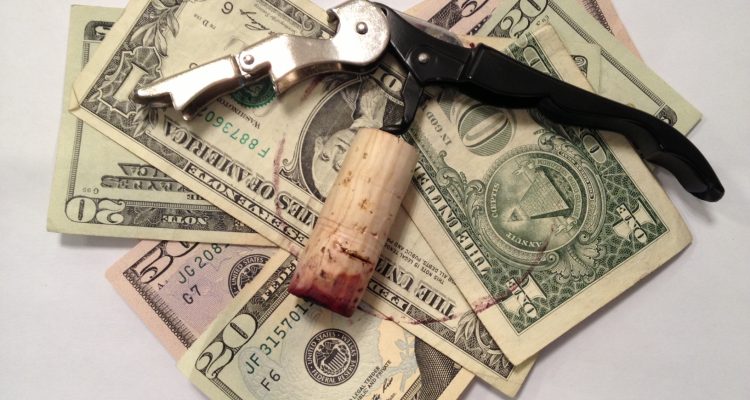by Gary Thomas and David Honig
A Palate Press editorial about copyright infringement by wine critic and author Natalie MacLean has unearthed new allegations of unethical behavior by the well-known wine writer. Winery proprietors described a pay-for-play system for wine reviews.

The Palate Press editorial called the publisher of Nat Decants to task for republishing other professional writers’ reviews without prior authorization — in other words, intellectual property theft. Online comments as well as social media reaction to that story brought to light new information that outlines a “pay-for-play” policy by MacLean in which she requires wineries to purchase a subscription to her online wine review pages before she will review the wines.
Palate Press has investigated the new allegations. Interviews and comments by different winery owners and managers — some of whom asked to remain anonymous, and others who agreed to go public — are consistent and reveal another disturbing pattern of questionable practices by MacLean.
One vineyard manager told Palate Press that MacLean solicited the winery for samples for review. MacLean told the winery where to send samples and required the winery purchase a subscription to the wine review section of Nat Decants.
An Ontario winery owner, in a widely seen Twitter comment, substantiated the allegations. He said MacLean asked for subscriptions in order to have wine reviewed both from his current winery and one where he had once worked.
Louis Calli, who worked in trade relations for a very well-known high-end Napa winery, also confirmed the allegations. MacLean, he told Palate Press, demanded that the winery purchase a subscription to Nat Decants before she would review their wine.
A former wine marketer, who could not be identified due to confidentiality agreements signed while working for several wineries and distributors around the world, tells a similar story. The marketer reached out to Nat Decants to inquire about submitting wines for review. The response was an explanation that in order to have the wines reviewed, a subscription to the newsletter should be purchased in the name of the winery.
The PR Director for a large Northern California winery, who is well-known to Palate Press but asked for anonymity in order to speak freely, explained that after arranging for an agent to deliver wines to for review, MacLean sent an email explaining that the winery needed to load all its information into her website, Nat Decants. This, alone, raises ethical questions. MacLean purports to be a wine journalist offering information on her website. She does not reveal, however, that the information she provides about wineries is not written by her, but rather by the wineries themselves. (The Association of Food Journalists’ Ethics Code states “to assure accuracy, so-called news communications or press releases should be substantiated.”)
After the winery PR manager provided the information, it could not be submitted. MacLean, when asked, explained that the wine reviews section of Nat Decants was subscription only, and the winery would have to subscribe to access the page, even to post the requested information. The cost of the subscription, MacLean pointed out, was “about the cost of a cup of coffee.”. The winery did not subscribe. A week later the PR manager received an email from MacLean stating she was ready to publish a glowing review as soon as the winery submitted the information to the site, an act that could only be completed with the purchase of a subscription.
A winery owner from British Columbia shared an email from MacLean explaining the “business model” behind requiring a subscription to submit samples. MacLean opined that online is today’s dominant medium, then went on to compare the Nat Decants subscription fee for reviews to entry fees for wine competitions. When the owner suggested paying for a wine review seemed like a conflict of interest, MacLean claimed the subscription requirement was the only way to keep up with the hundreds of samples arriving every month. She did not explain how purchasing a subscription helped with inventory maintenance. From there, MacLean got to the heart of the matter, saying the subscription fee would be “well worth your while” reaching the largest wine audience in Canada and the media exposure would be “worth thousands of dollars to you.” MacLean concluded that she was taking the time to taste the wine, write reviews , score the wine, and come up with tasting matches, as well as run her website, thus justifying the fee. “Once you go through the process,” MacLean promised, “you’ll be set up for the future.”
However. another British Columbia winery, which was not willing to go on the record, reports that it received good reviews on Nat Decants and was never asked to purchase a subscription. But, from the number of comments Palate Press received from industry insiders, that seems to be, for whatever reason, the exception rather than the rule for MacLean.
Richard P. Vine, Professor of Enology Emeritus at Purdue University and author of The Curious World of Wine, disputed MacLean’s comparison to wine competitions, stating, “wine competition fees are appropriated toward the event’s expenses (judges travel, per diem, honoraria, etc.) in the judging activity. It seems a stretch that a subscription fee actually supports such expenses for her. I know of no wine magazine that requires any such fee.”
Samuel Freedman, Professor of Journalism at Columbia University, was careful to note he could not comment on specific allegations with which he was unfamiliar. However, he said that as a general principle, a subscription requirement was “completely unethical, a journalistic version of ‘pay-to-play,'” — the practice in which people give campaign contributions in exchange for access to candidates. “Decisions on who gets covered or what gets covered, in order to be ethical,” Professor Freedman said, “must be made on journalist grounds.”
Dean Tudor, Ryerson University Journalism Professor Emeritus and Treasurer of the Wine Writers’ Circle of Canada, said such a request from an “above board media outlet is obviously unethical and would cause me concern.” But he adds that the practice can only exist so long as both the writer and winery are complicit in it.
MacLean’s “business model” of charging wineries for the privilege of having their wares reviewed is an inherent conflict of interest that undercuts any pretense of unbiased, honest wine reviews. Palate Press contacted MacLean and asked for her response to the allegations. She did not respond in time for publication.
** Update **
While Ms. MacLean did not reply to direct inquiries for comment, she did post a comment on the previous story. Said comment can be seen HERE.
 Gary Thomas, Wine Review Editor for Palate Press, is a 35-year veteran of journalism, spending much of his time having served as a foreign correspondent in places like Islamabad, Kabul, Phnom Penh, and Bangkok. He recently retired from Voice of America, where he worked as a senior correspondent/news analyst. He was the wine columnist for the Austin American-Statesman in Austin, TX and has also authored pieces for the Wine Spectator. He lives in Arlington, VA, across the river from Washington DC and just up the road from the Pentagon.
Gary Thomas, Wine Review Editor for Palate Press, is a 35-year veteran of journalism, spending much of his time having served as a foreign correspondent in places like Islamabad, Kabul, Phnom Penh, and Bangkok. He recently retired from Voice of America, where he worked as a senior correspondent/news analyst. He was the wine columnist for the Austin American-Statesman in Austin, TX and has also authored pieces for the Wine Spectator. He lives in Arlington, VA, across the river from Washington DC and just up the road from the Pentagon.
 David Honig, Palate Press’ Publisher, is an attorney with more than 25 years of experience in civil and criminal litigation. He is licensed in three states and multiple federal jurisdictions, including the United States Supreme Court. He is a self-educated oenophile, and defers to the tremendous experience and wisdom of the amazing staff at PALATE PRESS: The Online Wine Magazine.
David Honig, Palate Press’ Publisher, is an attorney with more than 25 years of experience in civil and criminal litigation. He is licensed in three states and multiple federal jurisdictions, including the United States Supreme Court. He is a self-educated oenophile, and defers to the tremendous experience and wisdom of the amazing staff at PALATE PRESS: The Online Wine Magazine.

